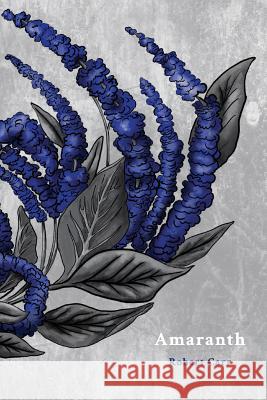Amaranth » książka
Amaranth
ISBN-13: 9781945023026 / Angielski / Miękka / 2016 / 48 str.
In one of the most important of the Aztec festivals, a month of fasting was ended by observers of the fast cutting up the figurine of a god made of amaranth seeds and honey and sharing it in small pieces. In Amaranth, Robert Carr feeds his readers portions of a god fashioned out of terror, longing, infidelity, wasting sickness, humor, and a searing lyrical tenderness. Crafted with the fingers of a careful and nimble musicianship, these poems vibrate with a current that simultaneously sets the teeth on edge and soothes the agitation the words produce. Even the most casual reader will be astonished by the muscular audacity of these poems--and pleasured by the harsh honey that flows from the poet's deft pillaging of the heart's unease. This is a remarkable debut. --Tom Daley The poetic drama in Amaranth arises from Robert Carr's intuition that a healthy enabling relation to one's past depends on an unflinching re-encounter with the details of the past. The poems choose not to settle for comfortable "lessons"--instead, they swim down, bravely, into haunted caverns of memory, seeking affirmations inseparable from the facts of moments, as in "Cremation," where the difference between two kinds of powder does it all. --Mark Halliday Slow, deliberate, and finely wrought, the poems in Amaranth remind the mouth that it has a tongue, remind the ear that it has a heart. Robert Carr's expressive voice is spare, honest, precise, and inventive as his poems careen from the furnace of love to the brutality of death all while offering the reader a gorgeous lyrical accuracy that's both delicate and unforgiving. --Ada Limon Robert Carr was born in Annapolis, Maryland and grew up in New Hampshire. He holds a BA in Philosophy from Bates College in Lewiston, Maine and a MEd in counseling psychology from the University of Massachusetts. He is Deputy Director, Bureau of Infectious Disease and Laboratory Sciences at the Massachusetts Department of Public Health. Amaranth is his first collection.
In one of the most important of the Aztec festivals, a month of fasting was ended by observers of the fast cutting up the figurine of a god made of amaranth seeds and honey and sharing it in small pieces. In Amaranth, Robert Carr feeds his readers portions of a god fashioned out of terror, longing, infidelity, wasting sickness, humor, and a searing lyrical tenderness. Crafted with the fingers of a careful and nimble musicianship, these poems vibrate with a current that simultaneously sets the teeth on edge and soothes the agitation the words produce. Even the most casual reader will be astonished by the muscular audacity of these poems—and pleasured by the harsh honey that flows from the poet’s deft pillaging of the heart’s unease. This is a remarkable debut.—Tom Daley The poetic drama in Amaranth arises from Robert Carr's intuition that a healthy enabling relation to one's past depends on an unflinching re-encounter with the details of the past. The poems choose not to settle for comfortable "lessons"—instead, they swim down, bravely, into haunted caverns of memory, seeking affirmations inseparable from the facts of moments, as in "Cremation," where the difference between two kinds of powder does it all.—Mark Halliday Slow, deliberate, and finely wrought, the poems in Amaranth remind the mouth that it has a tongue, remind the ear that it has a heart. Robert Carr's expressive voice is spare, honest, precise, and inventive as his poems careen from the furnace of love to the brutality of death all while offering the reader a gorgeous lyrical accuracy that's both delicate and unforgiving. —Ada Limon Robert Carr was born in Annapolis, Maryland and grew up in New Hampshire. He holds a BA in Philosophy from Bates College in Lewiston, Maine and a MEd in counseling psychology from the University of Massachusetts. He is Deputy Director, Bureau of Infectious Disease and Laboratory Sciences at the Massachusetts Department of Public Health. Amaranth is his first collection.











